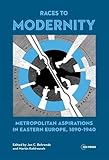Races to Modernity : Metropolitan Aspirations in Eastern Europe, 1890–1940 / ed. by Jan C. Behrends, Martin Kohlrausch.
Material type: TextPublisher: Budapest ; New York : Central European University Press, [2014]Copyright date: 2014Description: 1 online resource (370 p.)Content type:
TextPublisher: Budapest ; New York : Central European University Press, [2014]Copyright date: 2014Description: 1 online resource (370 p.)Content type: - 9789633860366
- Capitals (Cities) -- Europe, Eastern -- History
- Cities and towns -- Europe, Eastern -- Growth -- History -- 19th century
- Cities and towns -- Europe, Eastern -- Growth -- History -- 20th century
- City and town life -- Europe, Eastern -- History
- City planning -- Europe, Eastern -- History
- Social change -- Europe, Eastern -- History
- POLITICAL SCIENCE / Public Policy / City Planning & Urban Development
- Architecture, City planning, Growth, Modernization, Social change, Urban history, Urban studies
- 307.76/0947 23
- HT384.E852 R33 2014eb
- online - DeGruyter
| Item type | Current library | Call number | URL | Status | Notes | Barcode | |
|---|---|---|---|---|---|---|---|
 eBook
eBook
|
Biblioteca "Angelicum" Pont. Univ. S.Tommaso d'Aquino Nuvola online | online - DeGruyter (Browse shelf(Opens below)) | Online access | Not for loan (Accesso limitato) | Accesso per gli utenti autorizzati / Access for authorized users | (dgr)9789633860366 |
Frontmatter -- Contents -- List of Maps -- List of Tables -- List of Figures -- 1. Races to Modernity: Metropolitan Aspirations in Eastern Europe, 1890–1940. An Introduction -- THE SOCIAL AND THE NATIONAL QUESTION IN THE EASTERN METROPOLIS -- 2. Modernity as Mask: Reality, Appearance, and Knowledge on the Petersburg Street -- 3. Modernist Visions and Mass Politics in Late Imperial Kiev -- 4. Creating Polish Wilno, 1919–1939 -- 5. Modern Moscow: Russia’s Metropolis and the State from Tsarism to Stalinism -- URBANISM GOES EAST: THE DEVELOPMENT OF CAPITALS, INFRASTRUCTURE, AND PLANNING -- 6. Athens, 1890–1940: Transitory Modernism and National Realities -- 7. Between Rivalry, Irrationality, and Resistance: The Modernization of Belgrade, 1890–1914 -- 8. Architectural Praxis in Sofia: The Changing Perception of Oriental Urbanity and European Urbanism, 1879–1940 -- 9. Warszawa Funkcjonalna: Radical Urbanism and the International Discourse on Planning in the Interwar Period -- OSTMODERNE? EAST EUROPEAN MODERNISM -- 10. Capital Modernism in the Baltic Republics: Kaunas, Tallinn, and Riga -- 11. Imperial and National Helsinki: Shaping an Eastern or Western Capital City? -- 12. Modernizing Zagreb: The Freedom of the Periphery -- Bibliography -- List of Contributors -- Index
restricted access online access with authorization star
http://purl.org/coar/access_right/c_16ec
The comparative presentation of the birth of metropolises like St. Petersburg, Helsinki, Kiev, Belgrade, or Athens confirms the importance of the Western model as well as the influence of international experts on city planning at the periphery of Europe. In addition, this volume presents an alternative perspective that aims to understand the genesis of Eastern European cities with a metropolitan character or metropolitan aspirations as a process sui generis. The rapid expansion of metropolitan cities such as London and Paris began in the 17th and 18th centuries. Large parts of Central and Eastern Europe underwent urbanization and industrialization with considerable delay. Nevertheless beginning in the second half of the 19th century, the towns in the Romanov and Habsburg empires, as well as in the Balkans grew into cities and metropolitan areas. They changed at an astonishing pace. This transformation has long been interpreted as an attempt to overcome the economic and cultural backwardness of the region and to catch up to Western Europe.
Mode of access: Internet via World Wide Web.
In English.
Description based on online resource; title from PDF title page (publisher's Web site, viewed 20. Nov 2024)


